EVOL's cardboard houses
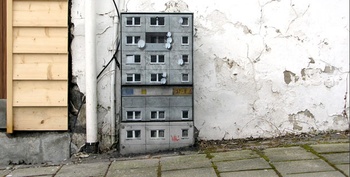
Do grey apartment buildings make cities ugly? The Berlin-based street artist EVOL doesn’t think so. On the street, he transforms banal flower boxes and grey meter boxes into playful miniature buildings. For his work in galleries, EVOL paints cardboard packaging materials. With photographic precision, he uses stencils and spray-paint to create windows and doors on brown cardboard that still shows traces of ripped packing tape and stickers.
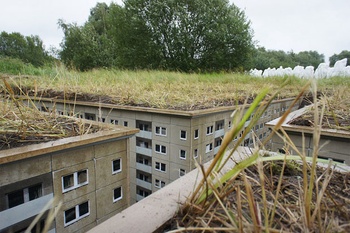
(Rural City, 2011 © EVOL)
What is it that attracts you in those apartment blocks?
EVOL: I’m naturally interested in architecture and buildings in general, as they’re the “containers” of people’s lives. To me, façades are like the faces of society. I started to bring these small apartment blocks into city centres as reminders of their bigger brothers and sisters from the city’s outskirts.
What is it that attracts you in those apartment blocks?
EVOL: I’m naturally interested in architecture and buildings in general, as they’re the “containers” of people’s lives. To me, façades are like the faces of society. I started to bring these small apartment blocks into city centres as reminders of their bigger brothers and sisters from the city’s outskirts.
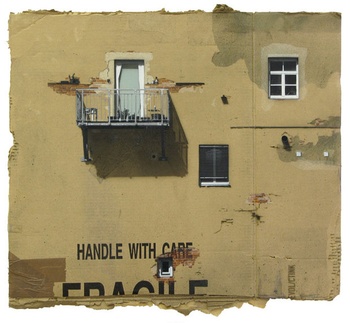
(As Careful As Necessary, 2010 © EVOL)
However playful your work, it is also a bit grim.
EVOL: I can’t deny that it brings a certain playfulness along with it. But miniaturising something doesn’t only make things cute. It is good to hear that you can still see the grimness in it.
However playful your work, it is also a bit grim.
EVOL: I can’t deny that it brings a certain playfulness along with it. But miniaturising something doesn’t only make things cute. It is good to hear that you can still see the grimness in it.
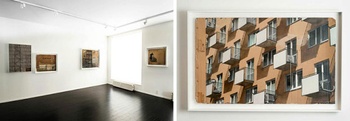
(Exibition views at the Bodson-Emelinckx Gallery)
There are plans to demolish the former East German apartment blocks in Berlin. How do you feel about the loss of the cities’ socialist heritage?
EVOL: I’m certainly not trying to preserve the socialist heritage in any way, least of all a romantic one. As the subject simply isn’t romantic. I’m rather pointing out the transformation of an architectural utopia into a dystopia. The idea may have been promising, or, due to a lack of resources, simply the only possibility, but as a symbol for egalitarianism it failed and became an even stronger statement for a class society. In your mind, these buildings will probably be first and foremost connected with the socialist countries, but the idea of erecting cheap living areas in a fast way, and neatly out of sight of city centres, has been implemented in urban outskirts all over the world. To me these apartment blocks are not a particularly socialist symbol, but a social symbol for class society. They get demolished because nobody wants to live there anymore. It’s not a great loss trying to change a hostile structure...
There are plans to demolish the former East German apartment blocks in Berlin. How do you feel about the loss of the cities’ socialist heritage?
EVOL: I’m certainly not trying to preserve the socialist heritage in any way, least of all a romantic one. As the subject simply isn’t romantic. I’m rather pointing out the transformation of an architectural utopia into a dystopia. The idea may have been promising, or, due to a lack of resources, simply the only possibility, but as a symbol for egalitarianism it failed and became an even stronger statement for a class society. In your mind, these buildings will probably be first and foremost connected with the socialist countries, but the idea of erecting cheap living areas in a fast way, and neatly out of sight of city centres, has been implemented in urban outskirts all over the world. To me these apartment blocks are not a particularly socialist symbol, but a social symbol for class society. They get demolished because nobody wants to live there anymore. It’s not a great loss trying to change a hostile structure...
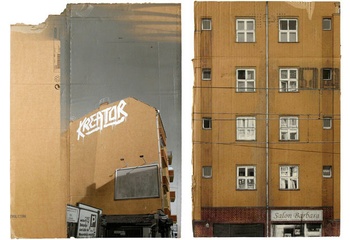
(Kreator, Graffiti Was My First Love, 2009 & Salon Barbara, 2010 © EVOL)
Is the street the ideal canvas for your work? You have a very different approach when putting together exhibitions in galleries. There you use cardboard boxes and packaging material as a canvas.
EVOL: Yes, to me the street and the gallery represent two totally different spaces and approaches. The miniaturised apartment buildings are meant to be placed in public space. I’m trying to change the appearance of structures and situations that already exist by a minor intervention. I like to work with electricity boxes, not only because of their shape and colour, but also because they’re functional objects and are therefore often overlooked. And I like their form and the fact that they are just everywhere, in every street, city, and country. The reception by the potential viewer is also totally different. My works in the street may just pop up one day and you only discover them by chance. While in a gallery, the visitors are already primed for what they are going to see, and are focused when entering the space. The gallery works may have the same topic as the apartment buildings placed in public spaces, but they show a completely different aspect of it. They show apartment blocks from the beginning of the last century; mostly from Berlin. They are beautifully aged and full of marks that tell the stories of their history. That’s why I choose cardboard as a corresponding material, because it’s the wrapping of people’s goods. It’s cheap, treated carelessly, and discarded after use. Like the walls of the buildings, it collects a lot of random marks as well. Cardboard ages just as beautifully.
EVOL > 6/10, wo/me/We > za/sa/Sa 14 > 19.00, Bodson-Emelinckx, rue de Henninstraat 70, Elsene/Ixelles, 02-648.40.06, info@bodson-emelinckx.com, www.bodson-emelinckx.com
Is the street the ideal canvas for your work? You have a very different approach when putting together exhibitions in galleries. There you use cardboard boxes and packaging material as a canvas.
EVOL: Yes, to me the street and the gallery represent two totally different spaces and approaches. The miniaturised apartment buildings are meant to be placed in public space. I’m trying to change the appearance of structures and situations that already exist by a minor intervention. I like to work with electricity boxes, not only because of their shape and colour, but also because they’re functional objects and are therefore often overlooked. And I like their form and the fact that they are just everywhere, in every street, city, and country. The reception by the potential viewer is also totally different. My works in the street may just pop up one day and you only discover them by chance. While in a gallery, the visitors are already primed for what they are going to see, and are focused when entering the space. The gallery works may have the same topic as the apartment buildings placed in public spaces, but they show a completely different aspect of it. They show apartment blocks from the beginning of the last century; mostly from Berlin. They are beautifully aged and full of marks that tell the stories of their history. That’s why I choose cardboard as a corresponding material, because it’s the wrapping of people’s goods. It’s cheap, treated carelessly, and discarded after use. Like the walls of the buildings, it collects a lot of random marks as well. Cardboard ages just as beautifully.
EVOL > 6/10, wo/me/We > za/sa/Sa 14 > 19.00, Bodson-Emelinckx, rue de Henninstraat 70, Elsene/Ixelles, 02-648.40.06, info@bodson-emelinckx.com, www.bodson-emelinckx.com
Read more about: Expo
Fijn dat je wil reageren. Wie reageert, gaat akkoord met onze huisregels. Hoe reageren via Disqus? Een woordje uitleg.